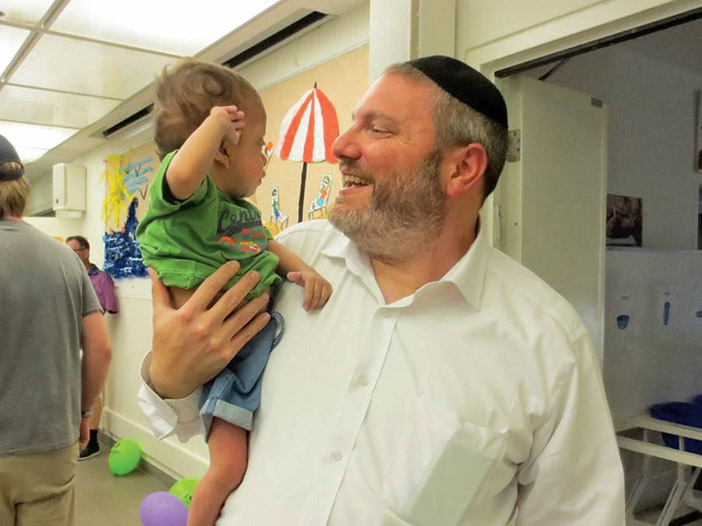
As Israel remarkably enters its 70th year, the now-not-so-young country has much upon which to reflect. From becoming the “Start-up Nation” to producing award-winning laureates in multiple disciplines to withstanding countless military assaults via technology and sheer willpower, Israel has established itself as a powerhouse in a great many things, coming a long way since its humble beginnings, when its mere existence was constantly called into question. Still surrounded by hostile neighbors, the country continues to face many hurdles and questions for its future. However, Israel knows one thing for sure: it is an inclusive society.
Since its birth, Israel has been a socially inclusive country. The country’s visionary father, Theodore Herzl, proclaimed long before the state’s founding that the “promised land” would be a place where each man would have dignity and live in peace, regardless of his roots or appearance. Proudly, Israel has turned this proclamation into a reality for its more than 8 million citizens.
Since the state’s establishment, war veterans with disabilities have received significant rehabilitation services. Over the last 70 years, legislation has continued to improve and there have been numerous developments focusing on disability rights and activism. Just this year, the government approved a NIS 4.2 billion increase in disability benefits, to be paid out over the next four years.
It’s no wonder that Israel places as one of the happiest countries in the world year after year. Despite its difficult surroundings, Israelis live happily due to their commitment to the value of human life. Under constant threat for seven decades, Israelis have been forced to reevaluate what really makes life worth living, and they have concluded that it is the gift of giving hope and support to others in need.
This attitude is exemplified by the nation’s willingness to channel the same innovation and creativity developed for its business and government sectors into the treatment and care of its most vulnerable citizens, and influences the many facets that make up Israeli society.
For example, The IDF’s Special in Uniform unit integrates thousands of young men and women with disabilities into the army each year. As military and civilian life are largely intertwined in Israel, the unit’s message of disability inclusion is vastly significant and impactful.
In Israel’s booming technology field, innovators are using their skills to focus on assistive technology. Just last month, an Israeli startup introduced a customizable universal adapter that connects strollers to wheelchairs, enabling parents who use wheelchairs to easily maneuver baby carriers.
Furthermore, businesses throughout the country have begun to seek out and hire individuals with disabilities. Café Harutzim, located in Jerusalem, trains and employs individuals with disabilities as waitstaff, while the Sea Watch application, a project of the Society for Protection of Nature in Israel that allows users to alert authorities about environmental incidents along the Mediterranean coast, employs individuals with physical, emotional and sensory disabilities in their call center. By establishing the employment of those with disabilities as the norm, these businesses are changing the way society views individuals with mental and physical challenges and making real employment opportunities available to all.
Civic leaders, organizations, and the Israeli government are actively ensuring that this message filters through to all Israelis, further exhibiting our nation’s exceptional commitment toward true disability inclusion. Just two years ago, ALEH, Israel’s network of care for individuals with severe complex disabilities, and Israel’s Ministry of Education launched Tikkun Olam, a project focused on educating Israeli high school students about disability inclusion. Through lectures, workshops and hands-on volunteering opportunities, this experiential education program exposes teens across the country to peers with disabilities and teaches them the importance of acceptance and inclusion.
In its first year alone, more than 10,000 Israeli students participated in the program, leading to a noticeable spike in youth-led volunteerism and social activism initiatives. Now in its second year, the program is poised to reach 100,000 students—every ninth grader in the country. Tikkun Olam’s overwhelming success and positive reception is just another example of the extent to which our society values inclusivity and continuously seeks to promote it. But there is still so much left to accomplish.
Established with the hopes of becoming a “light unto the nations,” Israel has, indeed, grown into a moral and social beacon to the world, boasting a society and government that genuinely cares for its people. At the same time, as Israel reaches its 70th birthday, the country must be wary of becoming complacent and work diligently to maintain the youthful energy and excitement that drives its inclusivity movement.
Like the Talmudic sage Rabbi Elazar ben Azaryah, a teenage prodigy who miraculously aged in appearance overnight to the ripe old age of 70 in order to be taken seriously by his colleagues and constituents, we must strive to have the best of both worlds: the strength and vigor of youth combined with the experience and sagacity of old age. While humans are slaves to chronology, countries have the ability to constantly renew their youthfulness and harness the wisdom of experience by looking ahead, remaining open to new ideas, and simultaneously learning from failure while focusing on success.
In this vein, Israel musn’t turn 70 years old. As a nation, we must turn 70 years young and commit ourselves to constantly shaping and reshaping our society until it’s something we can all be proud of—to investing whatever amounts of time, money and manpower are necessary to transform movements like disability inclusion into societal norms. When this becomes our new reality, we will not only be a “light unto the nations” but a beacon to ourselves.
By Dov Hirth
Dov Hirth leads the marketing and development for ALEH (www.ALEH.org), Israel’s network of care for individuals with severe complex disabilities and a global voice for disability inclusion and accessibility.










